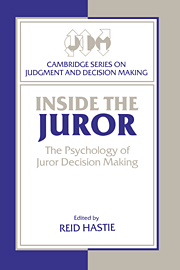Book contents
- Frontmatter
- Contents
- Series preface
- List of contributors
- Editor's preface
- Acknowledgments
- Part I Models of juror decision making
- Part II Commentaries
- 9 Notes on the sampling of stimulus cases and the measurement of responses in research on juror decision making
- 10 Sausages and the law: Juror decisions in the much larger justice system
- 11 A rational game theory framework for the analysis of legal and criminal decision making
- 12 Why do jury research?
- 13 Two conceptions of the juror
- 14 A mathematician comments on models of juror decision making
- Index of names
- Index of subjects
10 - Sausages and the law: Juror decisions in the much larger justice system
Published online by Cambridge University Press: 04 August 2010
- Frontmatter
- Contents
- Series preface
- List of contributors
- Editor's preface
- Acknowledgments
- Part I Models of juror decision making
- Part II Commentaries
- 9 Notes on the sampling of stimulus cases and the measurement of responses in research on juror decision making
- 10 Sausages and the law: Juror decisions in the much larger justice system
- 11 A rational game theory framework for the analysis of legal and criminal decision making
- 12 Why do jury research?
- 13 Two conceptions of the juror
- 14 A mathematician comments on models of juror decision making
- Index of names
- Index of subjects
Summary
My personal experience as a consulting statistician in legal hearings and trials and my exposure to research from a variety of intersections of social justice and the law have led me to view juror decision making as a small part of our legal institutions. When viewed from this broader perspective it is not clear that research on juror decision making should have the highest priority in our agenda of studies of legal decision making or of decision making in general.
First, I am impressed that juror decision making as an institution is designed to be opaque to the scrutiny of social scientists, the citizenry, and even legal authorities. It is not an accident that the instructions to jurors are sometimes vague, incomplete, and difficult to understand. In fact, there is a cliche that jurors frequently set aside these instructions and decide the case on its merits according to the dictates of their consciences and not according to written statutory law. I'm also impressed by the resistance of legal authorities to opening courthouses to exploration of social scientists. Again, I think it is no accident that we have federal laws forbidding social scientists and other reporters from penetrating into the mysteries of the jury room for a direct look on how the decisions are made. I'm reminded of the old aphorism admonishing us that people who love sausages (and the law) should never watch their being made. Contrary to the rampant curiosity of most social scientists, I wonder if those who love the institution of jury decision making should not also avoid watching it being done.
- Type
- Chapter
- Information
- Inside the JurorThe Psychology of Juror Decision Making, pp. 229 - 234Publisher: Cambridge University PressPrint publication year: 1993
- 1
- Cited by

